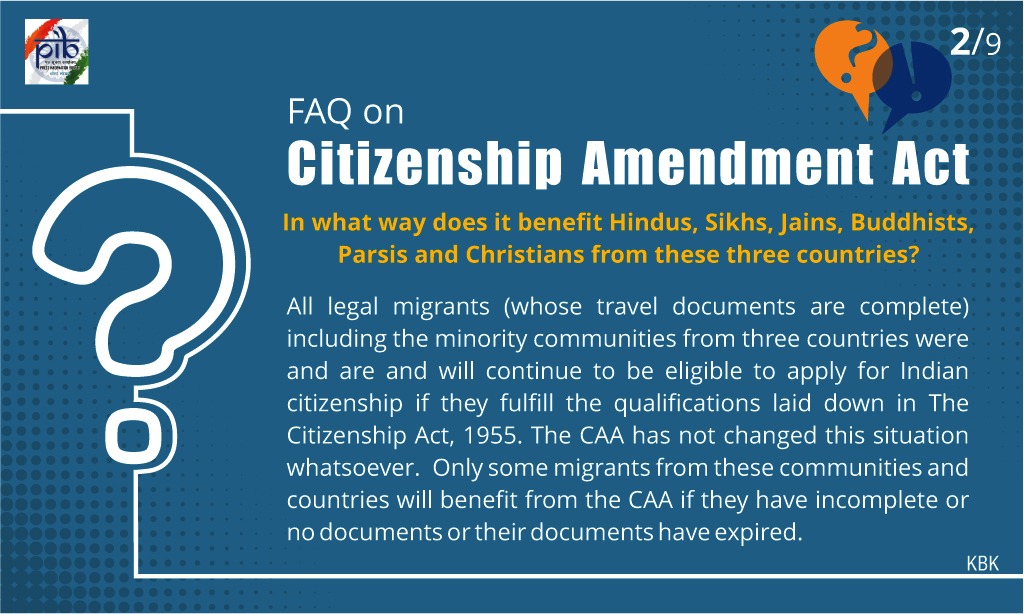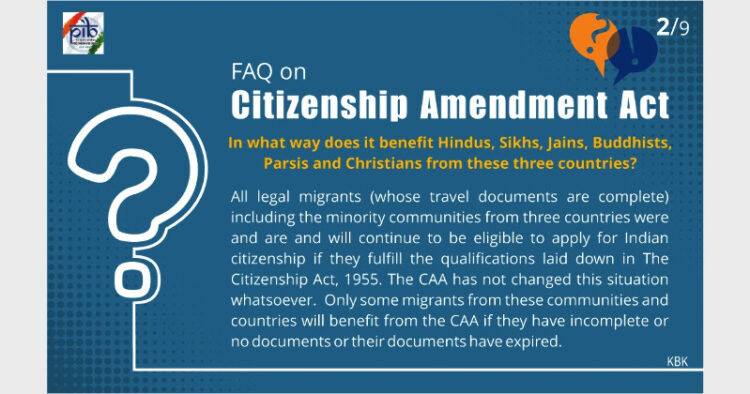
Press Information Bureau has published further FAQs on Citizenship Amendment Act. Did you know? The #CAA does not stop any foreigner of any country from applying for Indian Citizenship under The Citizenship Act, 1955. This, and other facts explained:
Question 1. Why shouldn’t Baluchis, Ahmediyas in Pakistan, Rohingayas in Myanmar not be considered for this kindness?
Answer: The CAA has not stopped any foreigners of any country from applying for Indian Citizenship under The Citizenship Act, 1955. Baluchis, Ahmediyas & Rohingayas can always apply to become Indian citizens as and when they fulfill the qualifications provided in the relevant sections of The Citizenship Act, 1955.
Question 2. In what way does it benefit Hindus, Sikhs, Jains, Buddhists, Parsis and Christians from these three countries?
Answer: All legal migrants (whose travel documents are complete) including the aforementioned minority communities from three countries were and are and will continue to be eligible to apply for Indian citizenship if they fulfill the qualifications laid down in The Citizenship Act, 1955. The CAA has not changed this situation whatsoever. Only some migrants from the aforesaid communities and countries will benefit from the CAA if they have incomplete or no documents or their documents have expired and they have taken shelter in India because of persecution on grounds of religion up to December 2014. They have been excluded from the definition of “illegal migrants” in The Citizenship Act, 1955. Unlike other foreigners, they are eligible to get citizenship after a total residency period of six years. For other foreigners, this period is twelve years.
Question 3. Doesn’t India have an obligation under the UN to take care of refugees?
Answer: Yes it does. And it is not shying away from it. There are more than two lakh Sri Lankan Tamils and Tibetans in India and more than fifteen thousand Afghans, 20-25 thousand Rohingayas and a few thousand other refugees of different nationalities presently live in India. It is expected that someday these refugees will return to their homelands when conditions improve there. Indian is not a signatory to the UN Convention of 1951 and the UN Protocol of 1967 on Refugees. Secondly, India is under no obligation to offer such migrants its citizenship. Each country including India has its own rules for naturalization.
Question 4. Will illegal Muslims immigrants from these three countries be automatically deported under this Law
Answer: No. The CAA has absolutely nothing to do with the deportation of any foreigner from India. The deportation process of any foreigner irrespective of his religion or country is implemented as per the mandate of the Foreigners Act, 1946 and/or The Passport (Entry into India) Act, 1920. These two laws govern entry, stay movement within India and exit from India of all foreigners irrespective of their religion or country.
Therefore, the usual deportation process would apply to any illegal foreigner staying in India. It is a well-considered judicial process that is based on a proper inquiry by the local police or administrative authorities to detect an illegal foreigner. It is ensured that such an illegal foreigner has been issued a proper travel document by the embassy of his country so that he can be duly received by officials of his country when he is deported.
In Assam, the process of deportation happens only after determination of such a person as a “foreigner” under The Foreigners Act, 1946. Then he becomes liable for deportation. Therefore, there is nothing automatic, mechanical or discriminatory in this exercise. State Governments and their district-level authorities enjoy the power of Central Govt. under Section 3 of the Foreigners Act and Section 5 of The Passport (Entry into India) Act, 1920 to detect, detain & deport any illegal foreigner.
Question 5. Does the CAA affect Indians (Hindus, Muslims, anyone)?
Answer: No. It has absolutely nothing to do with any Indian citizen in any way. The Indian citizens enjoy Fundamental Rights conferred on them by the Constitution of India. No statute including the CAA can abridge or take them away. There has been a misinformation campaign. The CAA does not affect any Indian citizens, including Muslim citizens.
Question 6. What about Sri Lankan Tamils?
Answer: India has provided citizenship to 4.61 lakh Tamils of Indian origin after signing PM level agreements signed in 1964 and 1974. Presently ninety-five thousand Sri Lankan Tamils are living in Tamil Nadu on Central and State Government subsidies and grants. They can apply for Indian citizenship whenever they become eligible.
Question 7. Why only these three countries? And why only religious persecution of above-notified denominations?
Answer: The CAA deals with persecution on religious lines in three neighboring countries where the Constitution provides for a specific State religion. Followers of other religions have been persecuted in these three countries. The Bill is very focused and provides a remedy for a particular situation in which some foreigners of these six minority communities find themselves.
Question 8. Does this mean that Muslims from these 3 countries can never get Indian citizenship?
Answer: No. Muslims from these three and all other countries can always apply for Indian citizenship and get it if they are eligible. The CAA has not stopped any foreigner from any country from taking citizenship of India provided he meets the existing qualifications under the law. During the last six years, approximately 2830 Pakistani citizens, 912 Afghani citizens, and 172 Bangladeshi citizens have been given Indian citizenship. Many hundreds of them are from the majority community in these three countries. Such migrants continue to get Indian citizenship and shall also continue to get it if they fulfill the eligibility conditions already provided in the law for registration or naturalization. About 14,864 Bangladeshi nationals including many from the majority community were also granted Indian citizenship after incorporating more than fifty enclaves of Bangladesh into Indian territory post the boundary agreement between the two countries in 2014.
Question 9. Whom does CAA apply to?
Answer: It is relevant only for Hindu, Sikh, Jain, Buddhist, Parsi and Christian foreigners who have migrated fled from Pakistan, Bangladesh, and Afghanistan into India up to 31.12.2014 on account of persecution faced by them due to their religion. It does not apply to any other foreigners including Muslims migrating to India from any country including these three countries














Comments